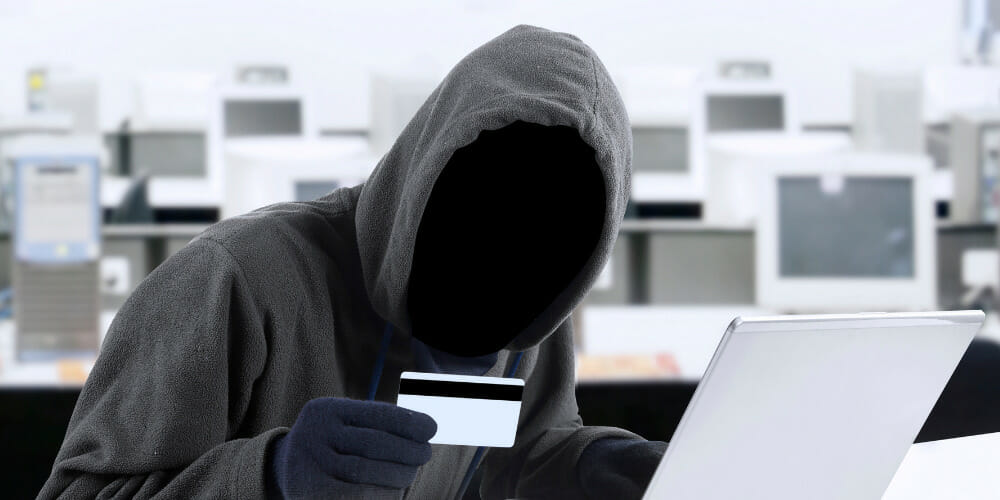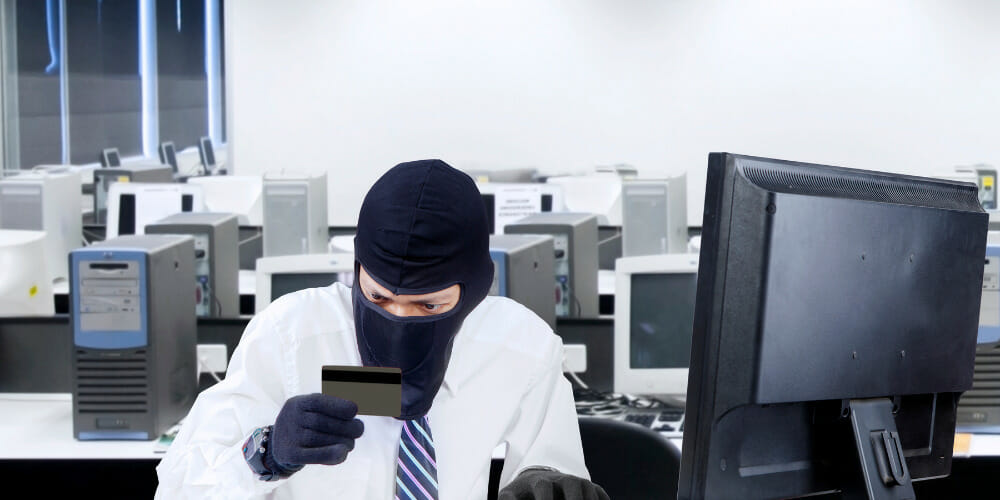Credit Card Fraud is a big issue not only in the United States but also around the world. Each year billions of dollars are lost in credit card fraud globally. That’s undoubtedly a considerable amount. But how often do these credit card frauds and thefts get caught?
Unfortunately, a very low rate of credit card fraud is being solved. According to statistics, less than 1% of credit card thefts are solved yearly. So, if you are a credit card theft victim, your chances of getting your money back are almost negligible.
In this blog, you’ll learn about various types of credit card theft and how to avoid them. So let’s get started!
What Is Credit Card Fraud?
Credit card fraud is the unauthorized taking of another’s credit card information in order to make purchases or withdrawals. In simple words, credit card fraud refers to scammers or thieves using your credit card to make transactions without your knowledge or consent.
This can be done by stealing the physical credit card, by intercepting credit card information electronically, or by accessing a person’s financial information through their own computer or phone. Credit card fraud can have a major financial impact on both the victim and the credit card issuer, so it’s important to be aware of the signs of fraud and how to protect yourself from it.
If you suspect that you’ve been a victim of credit card fraud, the first thing you should do is contact your credit card issuer immediately. They will be able to cancel your card and help you resolve any fraudulent charges.
You should also report the fraud to your local police department and to the Federal Trade Commission. By taking these steps, you can help protect yourself from further financial loss and ensure that the perpetrators are brought to justice.
How Does Credit Card Fraud Work?
Credit Card Fraud happens when someone (thief) steals your credit card and uses it for physical payments. Another possible way of credit card fraud is if someone steals your credit card data and uses it for online funds transfer or shopping.
By the time you receive notification for the transaction, the thief might have already used the stolen money from your credit card. Therefore, you must secure your credit card data and physical credit card to avoid credit card fraud.
Types Of Credit Card Frauds
Credit card frauds have been spreading globally in various shapes and sizes. Here are a few common types of credit card fraud that have happened so far:
Identity Theft
In this type of fraud, scammers steal the personal information of cardholders. Then they contact credit card issuers pretending to be cardholders to change credit card PIN codes or passwords to an online account and take over the account entirely.
This type of fraud is mainly detected when a scammer attempts to access an online bank—credit card account.
Stolen Credit Card Information
In this case, scammers steal credit card information and use it for online shopping or other digital transactions. Merchants or sellers can’t verify their identity as there isn’t a physical card in online shopping.
Such frauds are detected when cardholders get the notification for balance deduction.
Stolen or Lost Credit Card
The most basic credit card fraud is stealing someone’s credit card and then using it as much as you want. Some scammers even steal credit cards sent to cardholders in their mails.
Counterfeit And Skimming Fraud
In counterfeit and skimming fraud, scammers use special devices to steal information from credit cards by scanning the magnetic code on them. Scammers usually install these devices on ATMs. They use this information for their purpose or to sell it to others.
False Application Fraud
In this type of credit card fraud, the scammer may steal your personal information and use it to apply for a credit card. This type of fraud can only be detected when you check your credit score. False Application Fraud can be damaging to your credit score.
How Does Credit Card Fraud Get Caught?
There are many ways that credit card fraud can be detected. Sometimes it is through a simple process of monitoring spending patterns. Other times, it may require more sophisticated methods, such as data analysis or tracking down suspicious transactions.
Chargeback
One of the most common ways that credit card fraud is caught is through something called a “chargeback.” This occurs when a customer disputes a charge on their credit card statement and asks the credit card issuer for a refund.
Chargebacks can be triggered by many different things, but they often occur because the customer believes that they did not receive the product or service that they paid for. For example, if you purchase an item online and it never arrives, you may dispute the charge with your credit card issuer.
In some cases, chargebacks are also triggered by fraudulent charges. If you see a charge on your statement that you did not make, you should immediately contact your credit card issuer and file a dispute.
Data Analysis
Another way that credit card fraud is caught is through data analysis. Credit card issuers keep track of all of the transactions made on their cards and they use this information to look for patterns of fraud.
For example, if someone always uses their credit card to make purchases in the same location or at the same time of day, this may be cause for suspicion. Similarly, if someone regularly makes large purchases on their credit card and then quickly pays them off, this could also be a sign of fraud.
Freeze Account
If your credit card issuer suspects that you may be involved in fraud, they will usually contact you to ask for more information. In some cases, they may even freeze your account or cancel your card altogether.
If you think that you may have been the victim of credit card fraud, it is important to contact your credit card issuer as soon as possible. They will be able to help you dispute any fraudulent charges and will also be able to provide you with information on how to avoid becoming a victim of fraud in the future.
How To Prevent A Credit Card Fraud?
The banking sector has taken various measures to reduce credit card fraud. But the key is to guide the cardholders on how to avoid this threat. Here are a few preventions that you can take to prevent credit card frauds of all types:
Secure Your Wallet
The primary step is to secure the place where you keep your Credit Card. Always ensure that your wallet is safe and away from the reach of unknown persons (scammers). Keeping a separate small wallet for your credit cards is an excellent way to secure your credit card from snatchers and pickpockets.
Protect your physical credit card from scammers at all costs!
Bank Transactions
Most banks allow cardholders to monitor their credit card transactions online. So take the opportunity to avoid credit card misuse. Check your credit card transactions regularly and report to the bank if you notice any unusual activity.
Personal Documents
Keep your documents out of reach of others to avoid credit card frauds like false application fraud. Consider keeping all your records in the safe vault at home with other expensive things. In today’s age, our data is much more important than money. So, ensure that your personal information is secure.
Report Lost Credit Cards
To avoid unauthorized use, report to your bank as soon as your credit card is lost or stolen. As a cardholder, you must remember that as soon as your report a lost credit card, the quicker you’ll be able to prevent credit card fraud.
In such case, you must have the bank’s helpline number in your phonebook to avoid delay. Only reporting the lost credit card can secure you from credit card fraud.
Don’t Carry All Credit Cards
Unfortunately, carrying all credit cards may lead to all of them being stolen simultaneously. So, avoid taking them altogether. Carry only those that are necessary. You can also consider using RFID-Blocking Wallets to ensure the safety of your credit cards.
Always be conscious of threats like scammers and voice phishing. You should never give anyone your credit card information via phone call or text message. Scammers often pretend to be a new service provider and scam you into leaking your personal or credit card information.
You can avoid such scams by memorizing your PIN code and changing it often. Changing your credit card PIN code is now easier with online bank accounts and mobile apps.
Do Credit Card Companies Actually Investigate?
The primary question that arises in your mind after reading about potential Credit Card fraud is, do credit card companies actually investigate? In most cases, yes.
Credit card fraud investigations are held under the supervision of card provider banks. These are not directly handled by Visa or Mastercard networks. Card provider banks gather all necessary information about the unauthorized transaction and then examine it accordingly. However, credit card fraud being solved is very low, and often people think that credit card companies don’t investigate.
FAQs
Someone Used My Credit Card Online Can I Track Them?
If someone uses your credit card online without your knowledge, it can be difficult to track them down. However, there are a few things you can do to try and locate the person who made the unauthorized purchase.
- First, you should contact your credit card company and let them know what happened. They may be able to help you track down the person responsible for the unauthorized charges.
- Second, you can check your credit card statement to see where the charges were made. This can give you a good idea of where the person responsible for the unauthorized charges is located.
- Third, you can try and contact the merchant where the charges were made. They may be able to provide you with information about the person who made the purchase.
- Fourth, you can file a police report. This can be helpful in tracking down the person responsible for the unauthorized charges.
- Finally, you can contact a credit card fraud investigator. They may be able to help you track down the person responsible for the unauthorized charges.
How Credit Card Frauds Are Caught?
Credit card frauds are the least likely to be caught. However, the bank sector has introduced some solid protective measures to reduce credit card fraud as much as they can.
How Do I Know if My ATM Has a Skimmer?
Your ATM has a skimmer if:
- There’s tape or glue on the card insertion area.
- The card insertion area or PIN code screen looks bulky.
- Anything suspicious hanging with the ATM
What Happens To The Person Who Stole My Credit Card?
Unfortunately, nothing happens to the person who stole your credit card. However, if you don’t repost your stolen credit card, you will be liable for $50 under FCBA.
What Happens if You Falsely Dispute a Credit Card Charge?
If you falsely dispute a credit card charge, you may be subject to various penalties. For example, your credit card issuer may close your account, report you to the credit bureaus, or assess a fee for filing the dispute.
Additionally, if the merchant decides to take legal action against you, you may be responsible for court costs and damages. Therefore, it is important to only dispute charges that you believe are incorrect. If you have any questions about a charge on your statement, contact your credit card issuer or the merchant directly before filing a dispute.
Final Thoughts
Although Credit Card fraud is considered rare, many people become a victim of it every day. The bank sector has taken various measures to prevent this threat from happening. But as a consumer sector, you must also ensure to avoid credit card fraud with safety measures.
The damage will be solely yours if you don’t act upon safety preventions. So remember to keep yourself secure from all types of credit card fraud.













